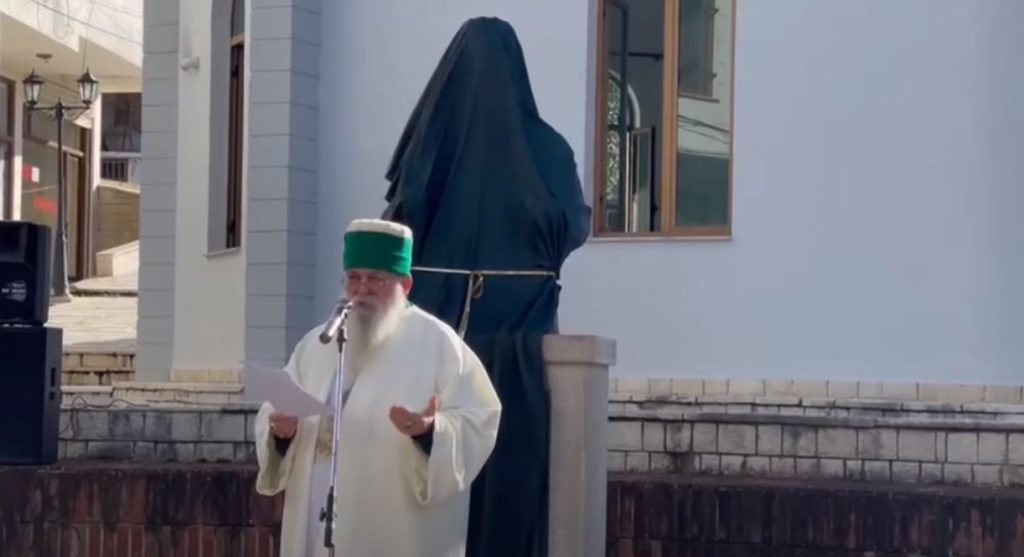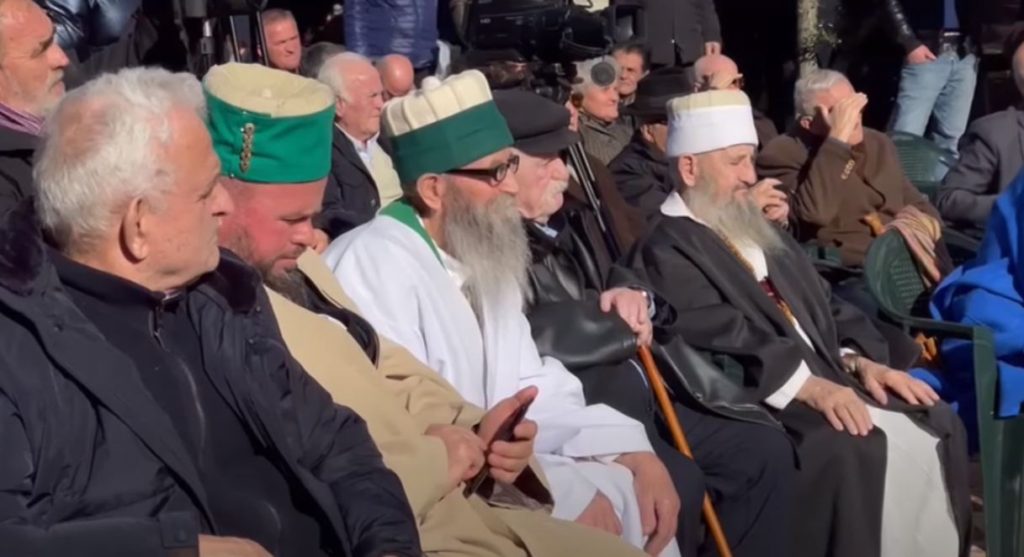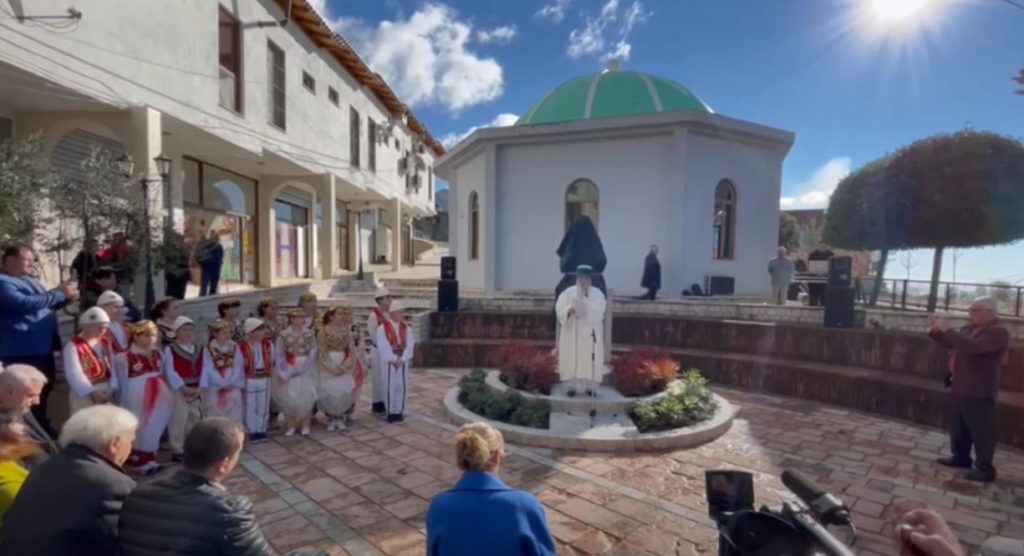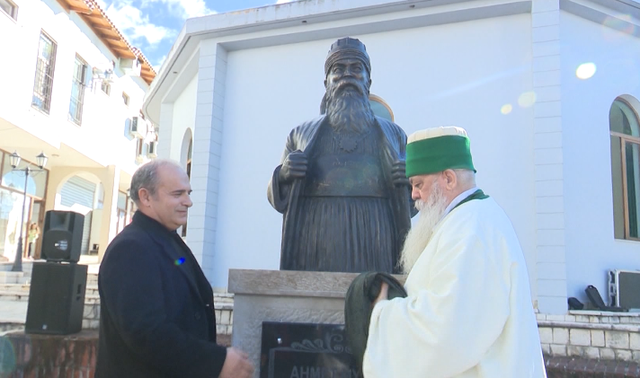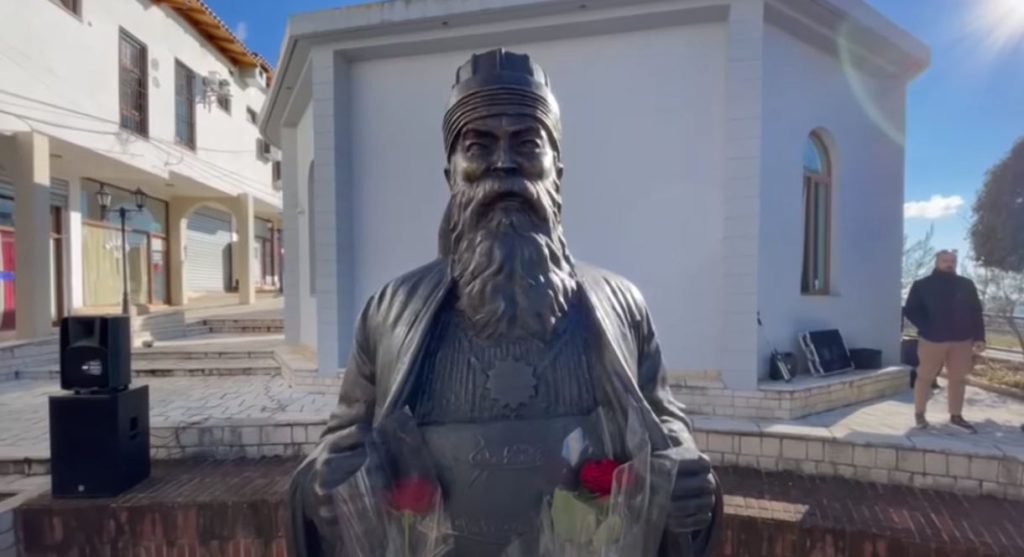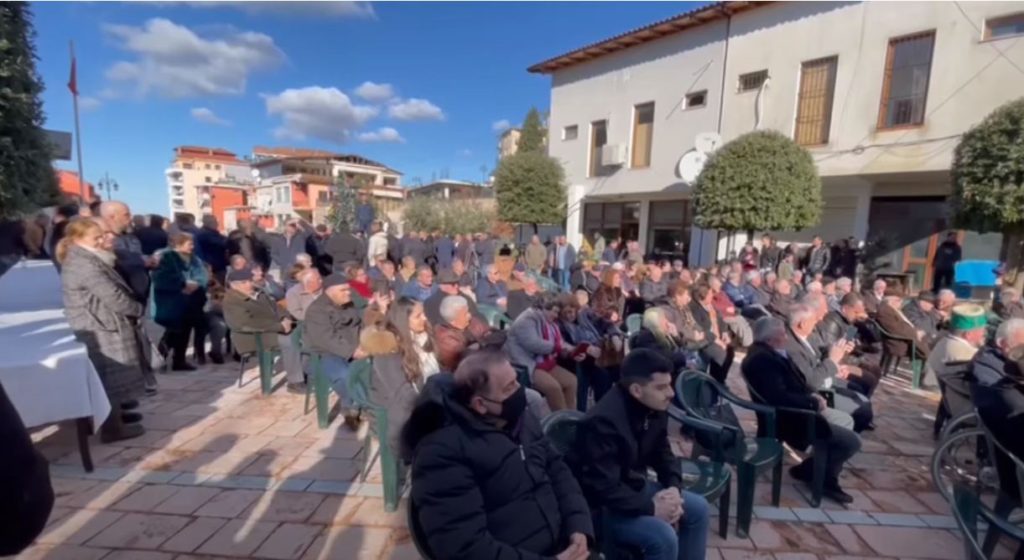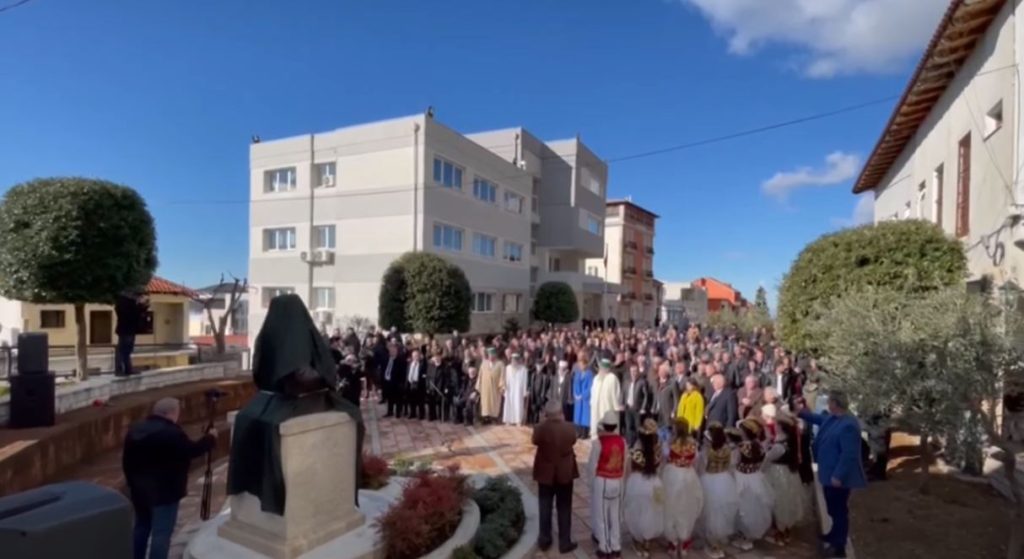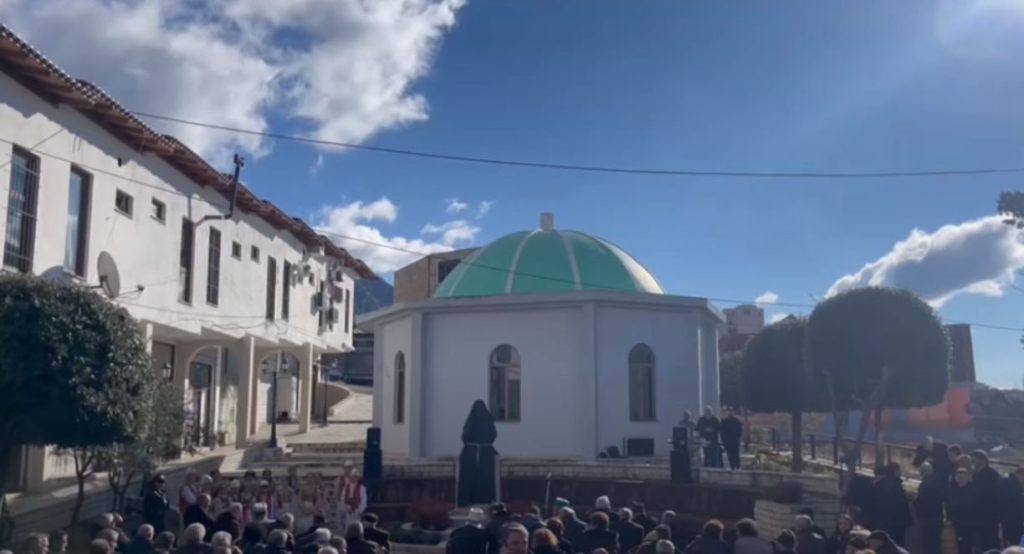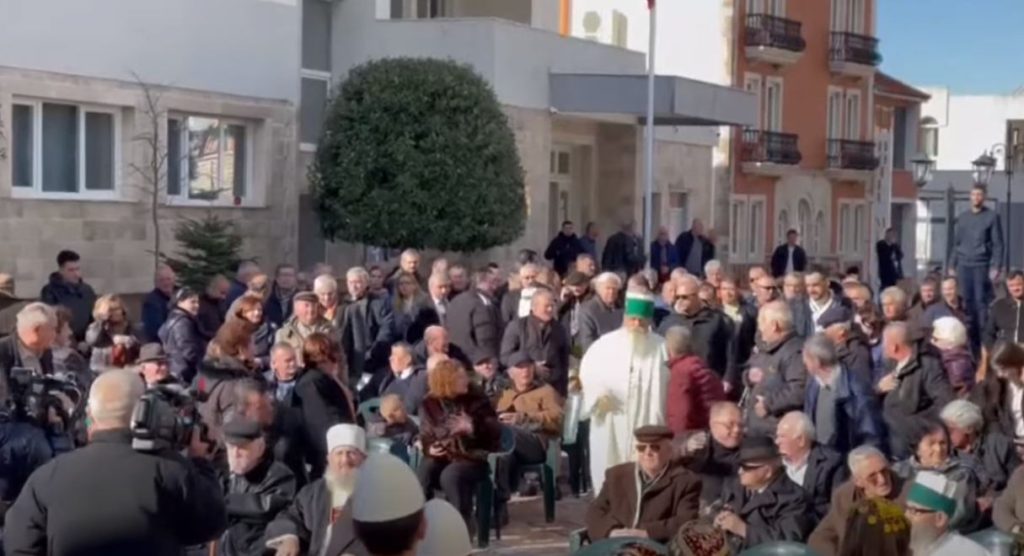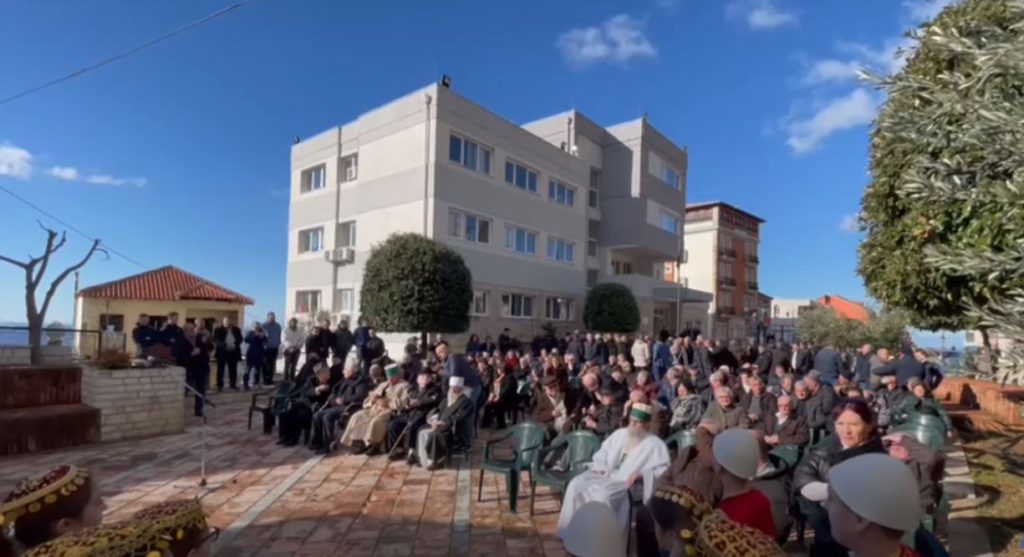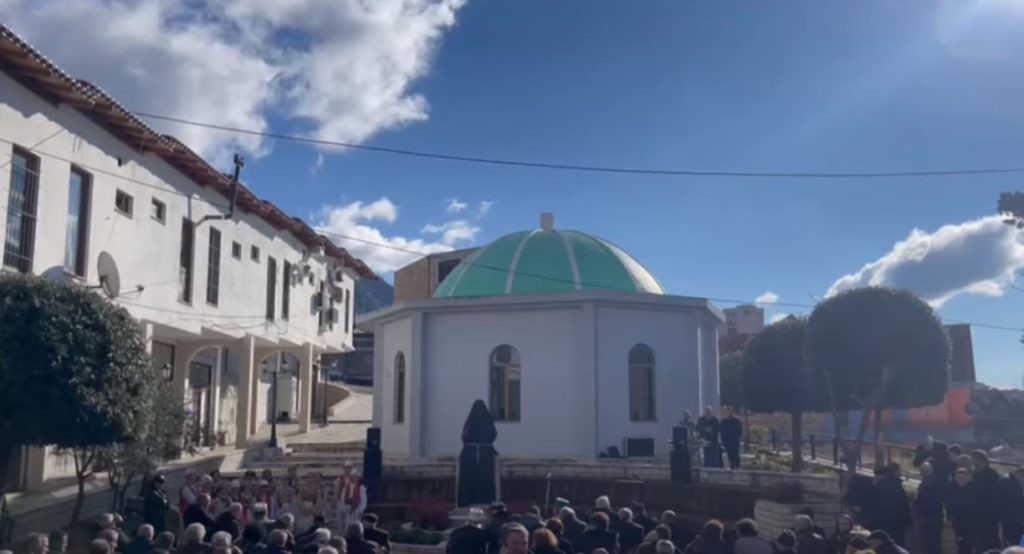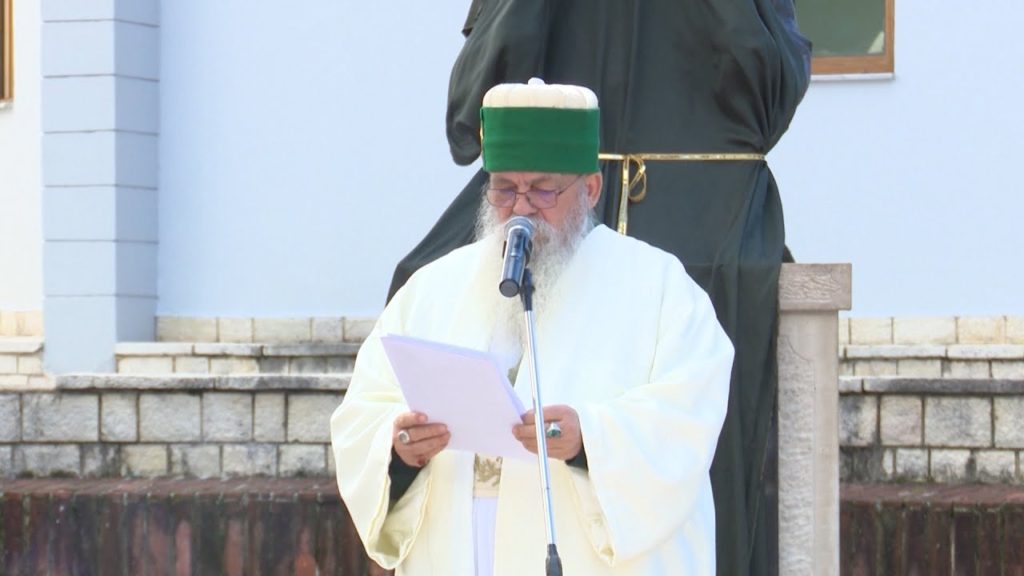
"Without a homeland there is no religion."
These are the words that Dede Ahmeti and all Bektashis keep in their consciousness keeping alive a tradition of patriotism and strong faith in God such as Bektashism.
The Bektashi World Headquarters in support of the Municipality of Kruja, placed on Thursday, December 30, 2021, near the tomb of Haxhi Hamza Baba in the city center, the bust of the former Bektashi World Leader, grandfather Ahmet Myftari, on the occasion of the 105th anniversary of his birth.
The ceremony was attended by the Bektashi World Leader, His Holiness, Haxhi Dede Edmond Brahimaj, the Mayor of Kruja, Mr. Artur Bushi, high personalities, clerics and believers, valuable followers of the traditions of Haxhi Bektash Veli!
In honor of this activity was held a concert with song and dance and a reception ceremony.
Greetings of the Bektashi World Leader, His Grace, Haxhi Dede Edmond Brahimaj:
Dear brothers, clerics and believers, valuable followers of the traditions of Haxhi Bektash Veliu!
Honorable Mayor of Kruja, Mr. Artur Bushi!
Distinguished guests!
First of all I would like to thank all of you who have come to share together the emotions of this important event and in the capacity of Bektashi World Leader, accept the prayers and blessings for a more peaceful and prosperous life for yourself and your families! May the Exalted God reward the value of your devotion and humility towards the monuments of our tariqat!
The placement of the bust of grandfather Ahmet Myftari, in the context of the 105th anniversary of his birth, precisely in this city, is much more than a gesture of honor and remembrance. This event, more than anything, is a memory, an eternal milestone, in the spiritual journey of the Albanian Bektashis in the last century. The times we are going through prove day by day that we all need history, especially the spiritual one, especially the lives lived full of humility and dignity of our clergy, who kept alive even in the most difficult days, the word of inexhaustible faith in God.
Dede Ahmet Myftari was born in the village of Brataj in Vlora, on November 15, 1916. Fate wanted him to be an orphan since his childhood, although he was able to do three classes of primary school in Brataj, to continue further in the city school of Vlora. Then, forced by family circumstances, he does various jobs, until he is called up for compulsory military service in Debar. Accustomed from an early age to the tradition of the Bektashi tariqah, while performing military service, he would be among the noble benefactors of the Bllaca tekke, staying true to our doctrine, until the last heartbeat.
He would be titled "dervish" by Sali Niazi Dede, the former World Grandfather in Tirana and would start his spiritual mission in the tekke of father Hamid in Elbasan. Later, in the years of World War II, the dervish from Brataj would line up with weapons in his arms, in the ranks of the formations of the national liberation movement, proving that he was the kind of cleric who loved doctrine in word and deed. Let us not forget, my dear brothers, that our Piri, Haxhi Bektash Veliu, eight centuries ago, has clearly stated that: "every Bektashi has an obligation to stand up for the fate of his nation." After the end of the war, like dozens of other dervishes and other Bektashi fathers, Dede Ahmeti served his mission in the tekke of Elbasan and Vlora, this time consecrated with the title "Father" by then Grandfather, Dede Abaz Mërtinji.
Of course, the historians of yesterday, today and tomorrow will deal with details from the life of grandfather Ahmet Myftari. But I judge it worthwhile to dwell on the three most important stages of his life and work.
The first stage has to do with his election to the important post of Bektashi World Leader. Realistically and specifically seen in the temporal context that coincides with the high functions of dede Ahmeti, his work, first proves the unwavering loyalty to the Bektashi identity, tradition and doctrine, which due to the times we were going through, were more endangered than ever. The event that took place in our Holy See in March 1947, was and remains an epochal moment not only in the Bektashi Albanian community, but in all the course of the eight-century history of our tariqat. The eyes of the Bektashis of the Balkans and beyond, would be directed to Tirana stuck after the great conjecture: Would the tradition of the Bektashi erqan continue, or would I be trampled by the communist regime? Would the magnificent tekke codes be preserved and developed, or would Bektashism become a political tool in the hands of policymakers?
Dede Ahmet Myftari solved this shocking dilemma of the Tariqat in that period with his devotion to God, proverbial wisdom and nobility. Numerous documents in the Central Archive of our State, but also in the memory and archive of the Holy See, clearly testify to his valuable role and contribution. During the years 1948-1957, when our grandfather headed the Holy See, he did his best to open new tekkes, to develop the faith through traditions, to protect dervishes and fathers from the "poisoned arrows" of the regime, to fight atheism by showing the love of eternal to the Creator.
All this his purely religious activity, would have a very expensive price. With typical communist manipulations, even dividing the fathers of that time into two opposing camps, the regime staged and carried out the departure from Tirana of Dede Ahmet Myftari and his internment in the ruined tekke in the village of Drizar in Upper Mallakastra.
The second stage of the life of this Bektashi saint is related to the stay of almost ten years in the tekke of Drizari, which in terms of the way he lived, with those mental, physical and spiritual suffering, is a moment that is both touching and glorious in Albanian religious life. The dictatorship that we left behind, even in that distant tekke, continued to guard and control in secret the lives of Dede Ahmeti and his loyal dervishes, Reshat Bardhi, but nevertheless their work remained courageous and religious to the point of self-denial, remembering the mechanisms of the former assurance of the state, that the upper heights of the soul, do not recognize the laws, hatreds or manipulations of ordinary mortals.
All of us are witnesses of the fact that the tekke of Drizar was transformed into the Bektashi World Center, where believers from Albania, Kosovo, Northern Macedonia and Montenegro came to receive the blessings of uncle Ahmeti. I take this opportunity today to mention with the deepest respect the contribution of all those families of our historical Kruja, of Kruja of Sari Salltik, of Shememi Babai as well as of hundreds of wonderful dervishes and fathers, who were not shared with Ahmet Myftari and dervish Reshat Bardhi in their most difficult times. With this act, in fact the Bektashi believers of Kruja, who are in the thousands and can not mention their name, confessed the traditional love of myrshyd for myrshyd, meanwhile challenging the regime itself. Today and tomorrow generations of Bektashi believers,
The last stage of the work of dede Ahmet Myftari, I think should be seen in the optics of sad events in 1967, when the folly of the previous regime, paradoxically led to the closure of religious facilities throughout Albania. Our historiography has proved with numerous facts and documents of all kinds, that despite the spiritual repression, Albanian believers of all religions and faiths, in a very dangerous way, secretly continued to worship God and walk according to His commands, ignoring the obscurantist regime. In our case, of Bektashism, it must be said that we had two mountains where we relied, dede Ahmeti and dervish Reshati.
Many of us who are in this square today, but also others who have left this world, have felt inside, that blessed spirit that Dede Ahmeti shared for everyone. His small room, in the neighborhood "Ali Demi", as well as the room of the dervish Reshat Bardhi afterwards, will remain eternal squares, where our tariqat breathed. They have been and remain sacred objects of worship, where believers found warmth in that bitter winter of dictatorship.
But let me remind you, that there were also many houses here in Kruja, which by opening their doors to these two saints, became objects of forging of our Bektashi brotherhood.
Sisters and brothers!
With the passing away from this world of Dede Ahmet Myftari, on July 10, 1980, our hopes were based on his faithful student, Dede Reshat Bardhi, who continued the resistance until the 1990s, to join us with father Selim Kalicani, father Bajram Mahmutaj , father Ismail Jangulli, father Tahir Emini, father Mumin Lamaj, father Haxhi Saliaj, father Sherif Cenometaj, and thousands of other believers and clerics in our spiritual journey. But throughout this journey, we had near the bright memory of the work of dede Ahmeti, who remained a symbol of Bektashi dignity.
Therefore today, with the placement of the bust of our myrshid in this blessed place, in the historical center of Kruja, we have done nothing but an obligation deriving from the goodness that his soul has bestowed on life and weather. The way dede Ahmet Myftari lived his life in this world, will remain a unique model for us who have known him and for others who will come and talk to him, in this square today.
Once again, let me thank the local government here in Kruja for the respect they showed on this occasion, assuring them that our tariqat will remain as always an example of religious harmony of the city, an important factor in the religious unity of Albanians.
God bless you all!
Amin!
